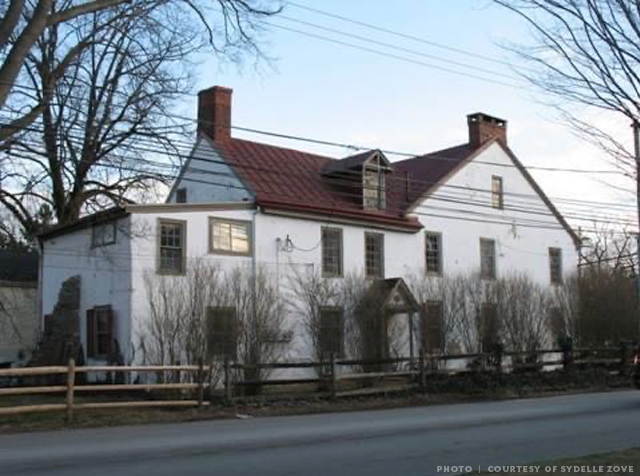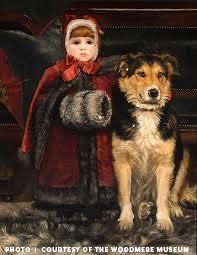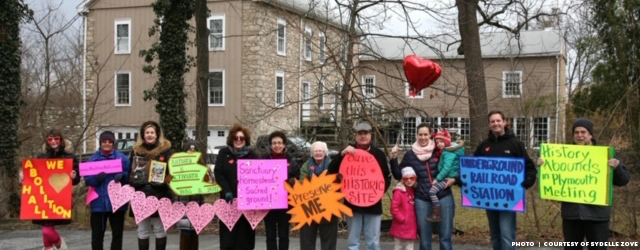By Marita Krivda Poxon
The Corson homestead located at the corner of Butler and Germantown Pikes in the heart of the Plymouth Meeting National Historic District no longer faces the prospect of being subdivided by K. Hovnanian to build 67 townhouses.
The Corson Homestead consisting of Abolition Hall, the Hovenden House and the Stone Barn along with ten acres is sacred to Underground Railroad historians since famous abolitionists like Frederick Douglass, Lucretia Mott and William Lloyd Garrison spoke in Abolition Hall.
It is also sacred to art historians since the great Irish-born artist Thomas Hovenden lived in what is now known as Hovenden House, where he was visited frequently by fellow Pennsylvania Academy of Fine Arts artist Thomas Eakins.

As open land, the Corson Homestead is sacred to preservationists who treasure its ten acres. This land has been cultivated continuously since the mid-1770s and is a sanctuary for over 400 trees, three wetlands and wildlife.
Sydelle Zove, convener and head of the Friends of Abolition Hall, is overjoyed with this recent decision since she has battled this developer for years organizing a passionate group of historians and lovers of open spaces.
Hovnanian has withdrawn its agreement of sale with the estate heirs of the Corson Homestead for reasons not at all clear to Zove. But she and the Friends of Abolition Hall deserve credit for this victory no matter how it came about, since they have fought this battle for years.
They raised funds to pay for a panel of experts who submitted reports in opposition to this high-density development. And enlisted local citizens to express their outrage on such a development on so pivotal to the American abolitionist movement.
In October 2018, Hovnanian received the approval of the Whitemarsh Township Board of Supervisors for conditional use of the 10-acre Corson property having fought off the Friends’ well-organized opposition at crowded community meetings in the township’s headquarters. In July 2020, the developer pulled out even after winning this battle. Now Zove is very hopeful that Whitemarsh Township will acquire the Corson Homestead.
The Chair of the Board of Supervisors, Laura Boyle Nester, spoke about having another certified appraisal done of the Corson Homestead — which would update the township’s 2014 appraisal. This new appraisal would be used by the Board to justify the price the township will offer to purchase the Corson Homestead from the heirs. These heirs are Ann Wilson and her two siblings, all direct Corson descendants. Nester in a recent Philadelphia Inquirer article has said:
“Personally I find that history of Abolition Hall critical to maintain. Whitemarsh is pursuing all options to buy the land and preserve both the history and the open space…We are in a unique position to try again. My hope is that the owners are going to be open minded about various options…”
Many years ago Zove was asked if she could wave a magic wand and make anything happen, how she would like to see the land and the structures used. The early ideas she might have had will not remain in the background of her thinking for much longer if the Township succeeds in purchasing the Homestead from the heirs.
In recent remarks, Zove has stressed that the eight acres of undeveloped land should not be built upon and must remain as open space.
Ideally the former farm land would become a Whitemarsh Township park for recreational use. For the three historic structures (Abolition Hall, the Hovenden House, the Stone Barn) listed on the National Register of Historic Places, Zove envisions a museum on site.

Housed in one of these three buildings, this museum could tell stories: the Underground Railroad, Abolitionists, the Quaker Corson Family, the township’s 18th Century Lime Kiln industry and Thomas Hovenden, Irish-born painter.
If Whitemarsh Township acquires the property and gets site control, Zove envisions many other possibilities that could be explored. In recent years, Zove has consulted experts in historic preservation and adaptive reuse of historic buildings, hoping that this day might come when the Township might own the Corson Homestead.
She has suggested a future design workshop in preservation and adaptive reuse given by experts who would brainstorm on possibilities and explore the funding opportunities for these historic buildings along with its open land. The Friends of Abolition Hall would welcome the opportunity to organize and participate in such a workshop if the township acquires the site.
Zove has spoken passionately about preserving the land as open land and keeping the 400 trees, many of which are mature, hardwood trees which hold the land in place. The area is prone to flash flooding and the formation of sink holes. Zove says the saving of the open land would:
“Bring people from the community to live, to learn and to explore the open land and the historic structures. We would be preserving the open space which is so essential because the land is precious in our history and also in its role in our environment and the ecology of this community.”

